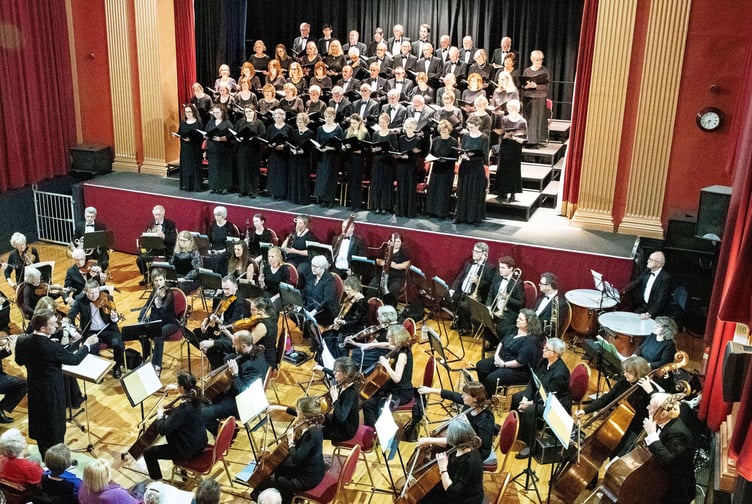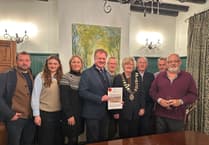Haslemere Musical Society (HMS) recently resumed rehearsals for its autumn season and the culmination of its centenary year celebrations.
The next concert is October 14 and the principal commemorative concert is at Haslemere Hall on December 2. The latter includes Beethoven’s Eroica symphony – played at HMS’ very first public concert in 1923, though next time round with no need for piano support!
One of the handful of amateur societies with both orchestra and choir, HMS was founded as an instrumental group by string teacher Annie Bristow, who led the violas and acted as secretary for 47 years. Anthony Bernard, founder of The London Chamber Orchestra, conducted from 1925 to 1946, leaving only because of commitments at the BBC.
Annie’s pupil Jill Pite recalled rehearsing behind the Haslemere Hall stage curtain, where in winter it was very cold despite a smelly paraffin heater; she could well believe that Annie’s housekeeper brought two baked potatoes to warm the conductor’s hands.
Joined by a madrigal group, the society performed opera and masques as Haslemere Orchestral and Madrigal Societies until formalised as HMS in 1939.
The Second World War provided stimulus from refugee musicians and music lovers arriving in the area. The 21st-anniversary season was celebrated in December 1943 by two performances of Mozart’s Idomeneo and Bach’s Christmas Oratorio. The war’s end was marked with performance of Beethoven’s Fifth Symphony, and the Festival of Britain in 1951 by Purcell’s Fairy Queen with the Haslemere Players.
Professional music directors have always been happy to travel long distances to the weekly rehearsals. Post-war conductors included rising composer John Gardner (1953-61) and John Lubbock (1970-73), later conductor of the Orchestra of St John’s Smith Square, London. Darrell Davison, who has conducted all four principal London orchestras, took the baton in 1982 for 25 years.
Since 2007, music director James Ross has commuted to Haslemere from Oxfordshire, and orchestra leader Tom Horn travels from Buckinghamshire. Tom Lydon, chorus master in 2015-17, is welcomed back this season.
HMS has had two long-standing chorus mistresses: Margaret Vine from 1974 to 1983, succeeded by Thelma Slade, a concert and oratorio singer under her maiden name of Thelma Godfrey, for 17 years, continuing to sing with the choir until she was 93.
HMS is one of the few amateur music societies profiled in a national newspaper. In 1988 the Financial Times’ lengthy feature noted how Darrell Davison “coaxed some tremendously moving music from his job lot of suburban bankers, retired civil servants and schoolteachers”.
In 1989 and 1993 HMS gave concerts in Bernay, Haslemere’s twin town in Normandy. Other one-off collaborations have included playing for the public walk-through of the newly-completed Hindhead Tunnel in May 2011, and recording the soundtrack for a documentary film, The Long Journey Home, in 2012.
In May 2016 the chorus was joined by students from Rodborough and Woolmer Hill schools for Carl Orff’s Carmina Burana and three years later Rodborough joined in Karl Jenkins’s The Armed Man.
HMS actively commissions new works, from Darrell Davison, William Godfree and latterly Clive Osgood, a prolific composer, director of music at St Bartholomew’s Church and HMS assistant chorus master and accompanist. The December 2 concert includes the premiere of Clive’s Sinfonia Cantiones.
It is unusual for an Emmy award-winning soprano to perform with an amateur society, but soon after moving to Haslemere, Janice Watson did just that. She sang Elgar’s Sea Pictures and Vaughan Williams’ Dona Nobis Pacem in 2020, days before the country went into Covid-19 lockdown. It was not until December 2021 that a full concert schedule could resume.
Janice made a welcome return for the first centenary year concert in March, in scenes from Carmen with tenor Philip O’Brien, another internationally-acclaimed artist who has been a regular HMS guest since moving to the area. James Ross’ doctorate in French opera gave further insight to that memorable performance.
Other distinguished guest soloists have included soprano Felicity Lott (Mozart Requiem, 1972) and Alexander Baillie (Elgar cello concerto, 2006). James Ross encourages orchestra principals to showcase their talents as soloists too – in May, the Schumann cello concerto was performed by section leader Anna Hunt.
HMS stages several annual events open to non-members. The Come and Sing in St Christopher’s Church often attracts more than 100 while the orchestral and choral summer sessions provide an opportunity to sight-read repertoire under young guest conductors.
These events help recruitment, though HMS welcomes new members at any time – in particular all voices (no auditions required) and upper strings. See the ‘Join Us/Membership’ section on the website www.hmsoc.co.uk
By Peter Sharpe





Comments
This article has no comments yet. Be the first to leave a comment.